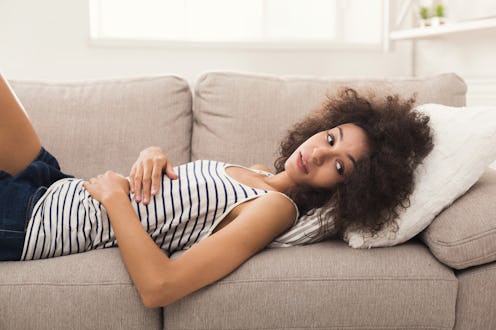Life
6 Natural Ways To Relieve Period Symptoms That You Probably Never Thought To Try
Over-the-counter pain medications are the go-to method for many people who deal with period pain. However, a 2016 study showed non-steroidal anti-inflammatory drugs (NSAIDs) only relieved period pain for 31 out of 100 study participants, meaning, pain meds aren't going to be super effective for everyone. To boot, while medication may help with cramping, you won't necessarily get any relief from your other PMS symptoms — like bloating or diarrhea. If you're tired of taking over-the-counter pain medications or relying on a heating pad to deal with period pain, there are other natural ways to cope with period pain.
"I always recommend finding a natural method to problems, rather than just blanketing them with medication." Dr. Prudence Hall, MD, founder of The Hall Center and author of Radiant Again, tells Bustle.
While experiencing period pain is pretty standard, you should be able to manage the symptoms at home. If you can't, it may be a sign that something more serious is going on. "Pelvic pain that interferes with day-to-day activities, gets worse after sex or a pelvic exam, causes painful bowel movements or urination associated with periods, and significant lower back pain with menses are not considered normal pains and could be signs of endometriosis," Dr. Rebecca Brightman, a gynecologist working with SpeakENDO, a campaign to raise awareness about the reproductive health disease, tells Bustle. "If a [person] experiences these symptoms, [they] should speak with [their] healthcare provider as soon as possible."
However, if you and your physician determine you're just experiencing run of the mill period pain, there are many ways to manage it without having to rely on over-the-counter pain medications as your sole relief from PMS symptoms. Here are six natural ways to cope with menstrual pain and PMS symptoms, that you've probably never heard of before.
1Get Prescribed Oxytocin
Oxytocin, aka "the love hormone," has some pretty funky health benefits. "Ask your doctor to prescribe oxytocin, a natural hormone (the same one that is released when women nurse) for cramps," says Dr. Hall. "Studies have found that a rise in oxytocin can actually help relieve pain. I recommend using it to help decrease menstrual cramps and general body aches, while also producing an overall feeling of well-being."
Of course, you can always stimulate oxytocin release naturally, through sex, cuddling, and or by simply being around friends and family you feel close to.
2Choose Foods According To Your Symptoms
Dr. Sophia Yen, the co-founder and CEO of Pandia Health, tells Bustle that you should try to tailor your meal plan to your PMS symptoms. She says, "In order to manage bloating, you can avoid salty foods as well as carbs to avoid constipation." However, if you are experiencing diarrhea rather than constipation, Dr. Yen adds to eat foods like rice.
3Up Your Omega-3 Intake
Both Dr. Hall and Dr. Yen suggest upping your intake of Omega-3 fatty acids if you're dealing with period pain. "Omega-3 can be very helpful as it helps to relieve inflammation and pain in the body, which can include menstrual cramps. It also has some other great health benefits, so it’s a win-win," says Dr. Hall.
You can get more Omega-3 through your diet by eating foods like salmon, flaxseeds, and soybeans during your time of the month. Or, you can opt to take a fish oil or cod liver oil supplement for more omega-3s.
4Vitamin E Oil Can Help Breast Tenderness
A 2010 study found that consistently taking Vitamin E oil, evening primrose oil, or taking them the two oil supplements in combination showed promise in reducing breast pain during that time of the month. Some foods high in Vitamin E include almonds, spinach, olives, and papaya.
5Try A Magnesium Supplement
According to the National Institutes of Health (NIH), magnesium is a vital mineral in the body that plays a role in everything from bone development to nerve function. "Women who experience the most severe menstrual cramps typically have low levels of magnesium. I recommend taking a magnesium supplement at night, as it’s been proven to help reduce inflammation, naturally," says Dr. Hall.
You can also eat your way to higher magnesium: Healthline reported foods such as avocados, nuts, and even dark chocolate are rich in magnesium.
6Take An Epsom Salt Bath
"Heat is always a good way to ease the pain of period cramps, and one of the best ways to do that is a hot bath. Being in a more relaxed state will ultimately make your entire body less contracted," says Dr. Yen. Moreover, Dr. Hall suggests taking bath time a step further by adding epsom salts, which contains magnesium and anti-inflammatory properties.
If over-the-counter pain medications do the trick when it comes to stopping period pain, then stick to what works. But, if you're needing a little bit of something extra to push through your PMS, consider giving one of these natural methods a try.
